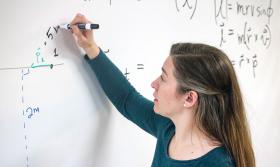Not-So-Difficult Transitions
Spring
2019
Pathways - Advice from Experienced Voices
Not-So-Difficult Transitions
How studying physics has helped me to step out of the box and into new life experiences
By:Katherine Zaunbrecher, SPS & Sigma Pi Sigma Executive Committee At-Large Member
 No one said it would be easy. In fact, that is why I chose to major in physics. People kept telling me that getting a physics degree would be very difficult. I wanted to prove to them—and to myself—that I could succeed in my studies. So I did.
No one said it would be easy. In fact, that is why I chose to major in physics. People kept telling me that getting a physics degree would be very difficult. I wanted to prove to them—and to myself—that I could succeed in my studies. So I did.
Even now I am not quite sure what my future endeavors are. Since graduating with my bachelor’s in science, I have moved across the United States, completed graduate school, worked at a national laboratory, and given talks around the country and the world. Now I’m teaching physics, mathematics, and so much more to middle and high school students who make my oftentimes challenging work very rewarding. And that’s just the career-related side. I know that whatever is in store for me, I am well equipped to handle any challenge, thanks to my education.
Studying physics provides much more than the opportunity to obtain a wide variety of jobs or a higher degree. It allows you to develop tools that will be useful throughout life, both in your career and otherwise. These tools are not merely intellectual and academic. Thanks to the late nights spent working on problem sets and trying to understand a concept that may one day seem simple, I was taught perseverance, the ability to effectively communicate and work with others, and how to be comfortable with not always knowing the answer. Going through a rigorous academic program which emphasized strengthening one’s critical thinking skills gave me the ability to readily face challenges. It also developed my intellect and confidence to tackle difficult problems.
Another important and not-so-obvious tool that comes with a degree in physics is the ability to manage transitions well. Even though the future often felt very uncertain for me as I began looking into graduate schools and jobs, studying physics helped prepare me for many of the major and not-so-major life changes that followed. Although I knew that I was not at the top of my class and would most likely not be producing ground-breaking research in my field, I had the confidence to believe that I could succeed at anything I wanted to pursue. That meant being able to handle the stress of graduate school on my own, admitting when I could not handle it, and asking for help when I needed it. It also meant embracing the uncertainty I felt after completing my PhD while transitioning into a research position. Additionally, it helped ease my mind when, almost three years into research I decided that a long-term career in academia or research was not for me. The time I had between research and a new teaching job gave me room to reflect and mentally prepare myself for what I knew would probably be the biggest transition I had yet to make.
Teaching physics and mathematics has been a joy. It is also stressful and difficult at times, but the challenges are different from research. Yet, I was more than prepared. Being solid in my content, which is more than many other high school physics and math teachers can say, has meant that I can focus more time and energy on developing other skills that are useful to managing a classroom, building curricula, and motivating and engaging students. While I still struggle with the occasional onset of imposter syndrome—even the best of us do—I have been well equipped with the tools necessary to succeed. I owe many of my successes, as well as my desire and willingness to try different things, to my education and training as a physicist. I hope that you are also able to recognize the many wonderful opportunities that being a physicist gives you.
